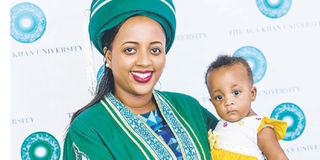This doctor has found her passion in Family medicine

Dr Nancy Matillya with her daughter at her graduation in Dar es Salaam. photo|courtesy
What you need to know:
- She was the sole graduate of the FM course in her year and she is already practicing at the Aga Khan Clinic in Masaki Dar es Salaam. She graduated in 2015.
When Dr Nancy Matillya decided to practice Family Medicine (FM), it didn’t matter that she was the only one in class.
She was the sole graduate of the FM course in her year and she is already practicing at the Aga Khan Clinic in Masaki Dar es Salaam. She graduated in 2015.
Dr Matillya, who is also an instructor with the Aga Khan University (AKU) in Dar es Salaam, says that she has found her passion in Family Medicine—a field that would never have featured on her priority list about five years ago when she was a fresh graduate.
She admits that she had neither thought of it as a career path nor a medical discipline that could help doctors offer a wide range of services to patients in Tanzania.
Not many new graduates of medicine in Tanzania are aware of Family Medicine opportunities. Her story is typical of many youth who have joined the Aga Khan University’s Postgraduate Medical Education (PGME) programme.
“I don’t think there was any particular moment during my undergraduate days that I ever dreamt of becoming a family physician,’’ says Dr Mattilya. However, as the common adage goes, the unexpected always happens—and indeed, it did.
During her internship programme at the Aga Khan Hospital in Dar es Salaam, Dr Matillya got enticed into the FM world.
This was, after she heard success stories of medics who had decided to specialise as Family Medicine experts.
“As a junior doctor by then, I met experts who had pursued this course. I felt inspired by their stories,’’ says the medic.
“I then became curious about Family Medicine and got to know what it entailed. Later, I decided to take it up.
And now, here I am—a Family Medicine specialist,’’ says Dr Matillya who now holds a Master of Medicine (MMed) degree.
Dr Matillya now believes family doctors are the linchpin in ensuring that patients with various illnesses are well co-ordinated between their homes and hospitals, depending on the type of treatment they need.
As opposed to an internal medicine expert who typically deals with adults, a family medicine specialist cares for patients regardless of age—and the care that’s offered is long-term, she says.
“It’s usually important that a patient develops a relationship with their physician. It helps in boosting the continuum of care,” says Dr Nancy who trained for four years.
A long-term relationship between the doctor and a patient instills trust, she says. It also motivates the patients to accept personal responsibility for maintaining good health, she adds.
In a world of great technological advancement, there are changing patterns in the practice of medicine. Gadgets are becoming a substitute for the human side of the doctor-patient relationship.
According to Dr Matillya, the best way to restore that relationship is through the practice of family medicine.
“In family medicine, a doctor does not assume that they are just treating a disease—but the person as a whole, the home environment and lifestyle.”
The concept of the postgraduate-trained family physician, with due qualifications to deliver equitable health in communities is now generally accepted in many countries around the world. However, in sub-Saharan Africa, the concept is still relatively new.
Dr Matillya says she could be among Tanzania’s fewest family doctors. “Tanzania has very few family doctors. I know only four who graduated from AKU. I am the fifth.”
Trainees in FM at the AKU are exposed to a wide range of clinical problems and are offered the opportunity to acquire skills in a variety of procedures with a team-based approach to patient care.
And, they rotate in General Medicine, General Surgery, Obstetrics and Gynaecology, Paediatrics as well as Principle and Practice of Family Medicine.
They also learn Practice of Urban-based Family Medicine, Practice of Community-based Family Medicine, Practice of Rural-based Family Medicine and Research.
As people in the society become increasingly aware of their health rights, coupled with the growing access to medical insurance, patients are likely to hop from doctor to doctor seeking for what they believe are the best services.
As a family physician, Dr Matillya knows too well that what people define as the “the best’’ or “better’’ healthcare may at times be interpreted wrongly by the patients.
“Take an example of patients who practice what we call “doctor shopping”. A patient may visit multiple physicians and obtain multiple prescriptions or get medical opinions that they want to hear,’’ she says.
With the doctor-shopping or double doctoring, a patient may obtain prescriptions for narcotics and controlled drugs from more than one doctor.
According to Dr Matillya, doctor shopping may also happen because a patient doesn’t feel understood by their physician but, she says, “A family medicine expert can address all of the patient’s psychological and social challenges and stop the “doctor shopping”.”
In one of her speeches, the World Health Organisation Director General Dr Margaret Chan, has once described family medicine as a “backbone of health care”.
Addressing the World Congress of the World Organization of Family Doctors in Czech Republic three years ago, Dr Chann said, “The first physicians were generalists. Family doctors have always been the backbone of health care. Family doctors have always been the bedrock of comprehensive, compassionate, and people-centred care”.




